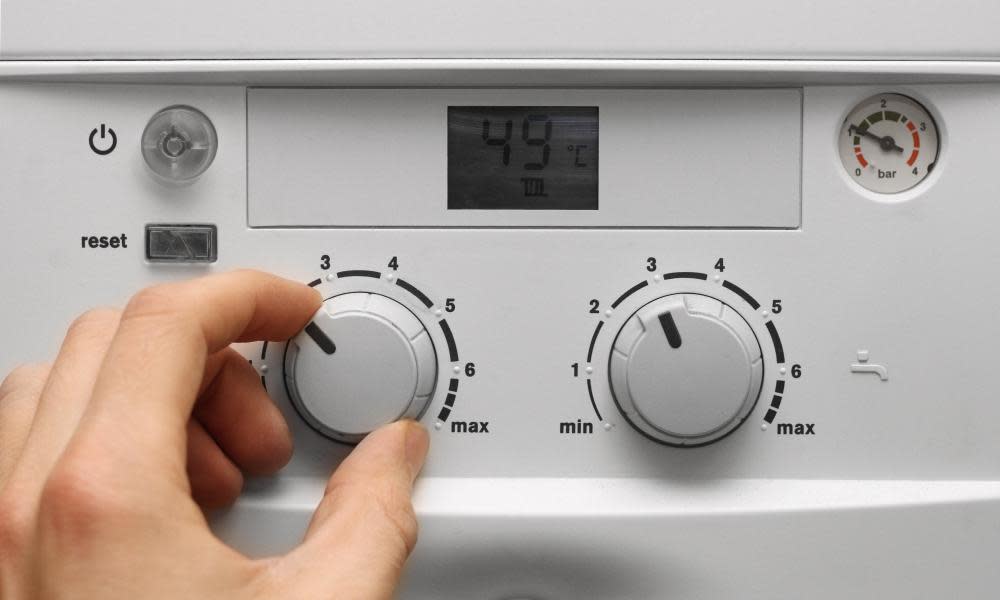Hydrogen is unsuitable for home heating, review concludes

Hydrogen is unsuitable for use in home heating, and likely to remain so, despite the hopes of the UK government and plumbing industry, a comprehensive review of scientific papers has concluded.
Hydrogen lobbyists are out in force at the Labour party conference this week, sponsoring several events in Liverpool, and will be plentiful at the Conservative party conference that begins this weekend.
They are hoping to persuade the UK government to push ahead with a mooted large-scale rollout of hydrogen for home heating, as a replacement for the gas used to heat the vast majority of British homes. Hydrogen proponents say it would avoid households having to replace gas boilers with heat pumps, the other main contender for low-carbon home heating.
But researchers reviewed 32 studies of hydrogen and concluded that it was unlikely to play a major role in home heating, either as a full replacement for fossil fuel gas heating, or as a blend with natural gas.
Jan Rosenow, Europe director at the Regulatory Assistance Project, an energy thinktank, and co-author of the study, said there were too many technical difficulties to overcome to make hydrogen a viable and economic low-carbon heating fuel.
“Using hydrogen for heating may sound attractive at first glance. However, all of the independent research on this topic comes to the same conclusion: heating with hydrogen is a lot less efficient and more expensive than alternatives such as heat pumps, district heating and solar thermal,” he said.
The study, published on Tuesday in the peer-review scientific journal Joule, is the third major blow in the past week to proponents of hydrogen for home heating. Earlier this week, a separate study by the analyst company Cornwall Insight concluded that hydrogen would be close to twice as expensive for home heating as using gas alone. Last week, the Guardian revealed problems with a hydrogen pilot project in Scotland.
Rosenow told the Guardian hydrogen was not the alternative to heat pumps that lobbyists were claiming. “For policymakers, hydrogen for heating appears attractive because it seems easy: just replace fossil gas with hydrogen with no impact on households. The reality is that significant technical alterations are needed including the pipework in homes and that it will cost people a lot of money to keep warm.”
Michael Liebreich, the founder of Bloomberg New Energy Finance and chairman of Liebreich Associates, said: “This is a timely paper, showing that no serious analysis has hydrogen playing more than a marginal role in the future of space heating. We need to get Europe’s heating systems off natural gas, and we need to do it without further delay. It’s time to stop the fight: the judges are unanimous and the winners are district heating, heat pumps and electrification.”
There are many other uses for hydrogen as a fuel, for instance in decarbonising heavy industry and shipping. If these industries are to be genuinely low-carbon, the hydrogen used will need to be generated using renewable energy, rather than coming from fossil fuels as some hydrogen does at present.
Some in the energy industry take a different view. James Earl, the director of gas at the UK’s Energy Networks Association, who represents the UK’s energy operators, told the Guardian: “No one heating system will get us to the UK’s net zero goals as a one-size-fits all approach to decarbonising heating will not work across the UK’s diverse customer base. We need to look at hydrogen, electrification and other technologies all as part of the mix.”
He added: “While hydrogen is expensive today, it is falling in cost rapidly and is forecast to fall to a similar cost to natural gas by 2030, if the cost of carbon emissions is fully recognised. Customers need choice and access to a range of technologies including heat pumps, hydrogen boilers, district heating and hybrid heating systems if we are to deliver a sustainable energy system for the future.”

 Yahoo Movies
Yahoo Movies 
